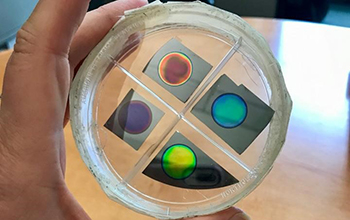
Research News
Research team is using insights to design adhesives for consumer products
August 3, 2020
Animals such as mussels are able to stick to their environment — literally. A scientist who studies ocean species to develop adhesives is now looking at the changing chemistry of seawater to see how it may affect the ability of mussels to adhere to their surroundings. The researcher is using these insights to design adhesives for consumer products.
Jonathan Wilker, a Purdue University chemist and materials engineer, studies how mussels secrete sticky plaques for attaching to wet surfaces. Wilker and colleagues use these discoveries to create new, biomimetic adhesives for everything from electronics and vehicles to construction structures and cosmetics.
“Seeing a fairly direct correlation between seawater iron content and mussel adhesive performance provides us with ideas for designing new and robust synthetic materials,” Wilker said.
The team details its U.S. National Science Foundation-funded research in the journal Environmental Science & Technology.
The mussels’ adhesive is rich in iron, which may help make the attachments strong and flexible. The team set out to test what happens when the animals are surrounded by different concentrations of iron.
“We wanted to understand how mussels’ access to iron might influence the formation and performance of their adhesive systems,” Wilker said.
The researchers grew animals in waters with low, regular and excess levels of iron. “We found that there was a general trend in which the strength of the mussels’ adhesive tracked with iron levels in the surrounding seawater,” Wilker said. “‘When there was less iron, the glue was weaker. More iron than normal brought about the strongest bonding. At an extreme excess of iron, however, performance dropped.”
As the oceans become more acidic, forms of iron transition from solid to dissolved, according to Wilker. “In the years to come, if less iron is in solid forms, these filter feeders will have difficulty capturing the iron they need for making their adhesive.”
Added David Rockcliffe, a program director at NSF, “The success of this project is a major step in the direction of enhancing basic understanding for producing ecologically safe biomimetic adhesives that could be applied in a wide range of circumstances.”
—
NSF Public Affairs,
researchnews@nsf.gov
Source: NSF News
Brought to you by China News








